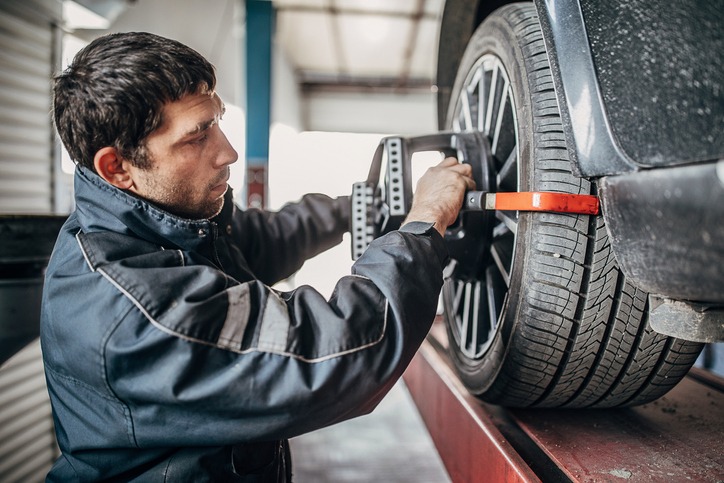Your vehicle’s tires play a critical role in the overall driving experience. When they are properly balanced, your car glides smoothly down the road, providing comfort, stability, and safety. However, imbalanced tires can disrupt this harmony, leading to a range of problems that can affect your vehicle’s performance and your driving satisfaction. In this comprehensive guide, we will explore the common symptoms of imbalanced tires and how professional tire repair can correct them.
Why Tire Balance Matters
Tire balance is the distribution of the weight of a tire and wheel assembly so that it rotates evenly. When your tires are balanced, it ensures a smooth ride, extends the life of your tires, and prevents unnecessary wear and tear on your vehicle’s suspension components. On the other hand, imbalanced tires can lead to various issues, from uneven tire wear to reduced fuel efficiency and poor handling.
Common Symptoms of Imbalanced Tires
- Vibrations: One of the most noticeable symptoms of imbalanced tires is vibrations. You might feel a shaking or vibrating sensation in the steering wheel, seat, or floorboard when you’re driving at certain speeds. These vibrations can vary in intensity but are typically most pronounced at highway speeds.
- Uneven Tire Wear: Imbalanced tires can cause uneven wear on your tire treads. You may notice that the tread on one part of the tire wears down faster than the rest. This not only reduces the lifespan of your tires but also compromises your safety, as unevenly worn tires have less traction.
- Reduced Fuel Efficiency: When your tires are imbalanced, it requires more effort from your engine to keep the vehicle moving. This increased resistance leads to reduced fuel efficiency, meaning you’ll have to fill up your gas tank more often and spend more on fuel.
- Steering Pull: If your vehicle tends to pull to one side when you’re driving on a straight and level road, it could be a sign of imbalanced tires. This can make your vehicle harder to control and, in some cases, it might also be a sign of alignment issues.
- Noisy Ride: Imbalanced tires can lead to excessive road noise. The vibrations and uneven wear can create a droning sound that can be quite annoying and disrupt the peace and quiet in your vehicle.
Tire Repair: Correcting Imbalanced Tires
If you’re experiencing any of the symptoms mentioned above, it’s essential to address the issue promptly. Neglecting imbalanced tires can lead to more significant problems and potentially compromise your safety on the road. Here’s how professional tire repair can correct imbalanced tires:
- Tire Balancing: The first step in addressing imbalanced tires is to have a professional tire repair technician balance your tires. This involves attaching small weights to the wheel rim to counterbalance the weight distribution. By doing this, the technician ensures that the tire and wheel assembly rotates smoothly.
- Rotation: In some cases, uneven tire wear can be corrected by rotating the tires. Tire rotation involves moving tires from one position to another on your vehicle to ensure even wear. This can extend the life of your tires and improve handling.
- Alignment Check: While not part of tire repair per se, an alignment check is often recommended in conjunction with balancing. If imbalanced tires are a result of misaligned wheels, correcting the alignment can prevent the problem from recurring.
- Tire Replacement: In severe cases where the tire damage is irreversible, or if the tires are too worn, you may need to replace them. A professional tire repair shop can recommend suitable replacements and ensure they are balanced correctly.
Benefits of Professional Tire Repair
When you encounter imbalanced tires, seeking professional tire repair offers a range of benefits:
- Safety: Correcting imbalanced tires enhances your vehicle’s stability and handling, which is crucial for your safety on the road. It reduces the risk of accidents and ensures you have better control over your vehicle.
- Extended Tire Life: By addressing tire balance issues promptly, you can maximize the lifespan of your tires, saving you money in the long run.
- Improved Fuel Efficiency: Balanced tires reduce rolling resistance, which means your engine doesn’t have to work as hard to move your vehicle. This leads to better fuel efficiency, saving you money on gas.
- Enhanced Comfort: A smooth and vibration-free ride is more comfortable for both the driver and passengers, making your daily commute or long road trips more enjoyable.
- Reduced Maintenance Costs: Preventing uneven tire wear can save you from having to replace tires prematurely. It also reduces the strain on your vehicle’s suspension components, which can lead to further savings on maintenance and repairs.
Maintaining Balanced Tires
To keep your tires in optimal condition, it’s essential to perform regular maintenance. Here are some tips to help you maintain balanced tires:
- Regular Inspections: Periodically inspect your tires for signs of wear and damage. Look for any unusual vibrations, steering pulls, or unusual noises when driving.
- Tire Rotation: Follow the manufacturer’s recommendations for tire rotation, usually every 6,000 to 8,000 miles. Regular rotation helps ensure even wear.
- Alignment Checks: Get your vehicle’s alignment checked whenever you notice steering issues, uneven tire wear, or after hitting a pothole or curb.
- Balancing: If you purchase new tires, have them balanced by a professional tire repair shop to ensure they are ready for the road.
- Proper Inflation: Maintain the recommended tire pressure, as underinflated or overinflated tires can also lead to uneven wear and balance issues.
In conclusion, the importance of properly balanced tires cannot be overstated. The symptoms of imbalanced tires can impact your safety, comfort, and your wallet. When you encounter these issues, don’t hesitate to seek professional tire repair. It’s an investment in your vehicle’s performance, longevity, and your overall driving satisfaction. With balanced tires, you can enjoy a smoother, safer, and more efficient ride, making every journey a pleasure.
